Don't wanna be here? Send us removal request.
Text
TELECALLING CRM: Streamlining Customer Interactions for Enhanced Efficiency
In today's fast-paced business landscape, effective communication with customers is paramount. Companies need tools that facilitate seamless interactions, improve customer relationships, and boost overall efficiency. This is where Telecalling CRM comes into play. In this article, we'll delve into the world of Telecalling CRM, exploring its benefits, functionalities, and how it transforms customer engagement.
Introduction
In a highly competitive business environment, companies must provide exceptional customer experiences to thrive. Telecalling CRM (Customer Relationship Management) has emerged as a vital tool that enables businesses to manage and optimize customer interactions efficiently. This article dives into the world of Telecalling CRM, shedding light on its functionalities, advantages, challenges, and future trends.
Understanding Telecalling CRM
Telecalling CRM is a technology-driven solution designed to streamline and enhance customer interactions through effective communication management. It serves as a centralized platform that empowers businesses to manage customer data, track calls, monitor interactions, and gain insights into customer preferences.
Key Features of Telecalling CRM
Contact Management
Telecalling Software CRM simplifies the organization of customer information. It allows users to store, update, and access customer details seamlessly, enabling personalized interactions.
Call Tracking and Recording
This feature enables businesses to track calls in real time, providing valuable data for analysis. Call recording helps in quality assurance, training, and dispute resolution.
Lead Management
Telecalling CRM assists in lead tracking and nurturing. It categorizes leads, assigns follow-up tasks, and ensures timely communication, increasing the likelihood of conversions.
Integration Capabilities
Modern Telecalling CRM systems offer integration with various communication channels and software, enabling a holistic view of customer interactions across platforms.
Benefits of Telecalling CRM
Enhanced Productivity
By automating manual tasks and providing a unified interface, Telecalling CRM enhances productivity among sales and support teams, allowing them to focus on high-value activities.
Improved Customer Relationships
Telecalling CRM fosters better customer relationships by enabling personalized interactions, quick issue resolution, and timely follow-ups, leading to increased customer satisfaction.
Data-Driven Insights
The CRM generates actionable insights from customer data and call analytics. This information aids in strategic decision-making, campaign optimization, and resource allocation.
Challenges Faced and Solutions
Adoption Resistance
Employees might resist using a new system. To address this, highlight the CRM's benefits, provide adequate training, and involve them in the implementation process.
Integration Complexities
Integrating Telecalling CRM with existing software can be complex. Utilize the expertise of IT professionals and ensure seamless data flow between systems.
Data Security Concerns
Protecting customer data is paramount. Choose a CRM with robust security features, including data encryption and compliance with data protection regulations.
Choosing the Right Telecalling CRM
Scalability
Select a CRM that can accommodate growth and increased customer interactions without compromising performance.
User-Friendly Interface
An intuitive interface reduces training time and ensures rapid adoption across the organization.
Customer Support
Opt for a CRM provider known for excellent customer support, ensuring timely assistance in case of issues or queries.
#telecallingcrm#telecallingsoftware#telecallingcrmsoftware#telecallingsoftwaredemo#telecallingmanagementsoftware
0 notes
Text
Unlock the Full Potential of Erp For Healthcare Industry

Are you seeking a seamless, efficient, and comprehensive solution to streamline your healthcare facility's operations? Look no further! We are providing Erp Software For Healthcare Industry, tailored specifically for the healthcare industry.
#erp#software#business#erpsoftware#technology#webdevelopment#crm#sap#erpsystem#erpsolutions#ecommerce#adsgrill#erpsolution#cloud#clouderp#saphana#sapbusinessone
1 note
·
View note
Text
ERP for the Healthcare Industry
Streamlining Healthcare Operations with ERP: Revolutionizing the Healthcare Industry
The healthcare industry is a vast and complex ecosystem where patient care, operational efficiency, and data management play critical roles. In recent years, as technology continues to advance, Enterprise Resource Planning (ERP) systems have emerged as a game-changer, revolutionizing the way healthcare institutions operate and deliver services. With the power to integrate various departments, automate processes, and optimize workflows, ERP has become an indispensable tool for healthcare providers in their quest to deliver better patient outcomes and improve overall efficiency.
Understanding ERP in Healthcare:
At its core, ERP is a software system that centralizes data and integrates various business processes across an organization. It serves as a single unified platform, consolidating information from different departments, such as finance, human resources, supply chain, inventory management, and more. This unified approach allows healthcare facilities to have real-time access to critical data, promoting informed decision-making and enhancing collaboration between teams.
Key Benefits of ERP in Healthcare:
Enhanced Patient Care: ERP systems in the healthcare industry empower medical professionals with instant access to patient records, treatment histories, medication information, and lab results. This seamless access to comprehensive patient data improves the accuracy of diagnosis, reduces medical errors, and ultimately leads to better patient care and outcomes.
Optimized Workflows: By automating routine administrative tasks, ERP streamlines processes and eliminates redundant activities. This not only saves time but also reduces the risk of manual errors, allowing healthcare professionals to focus more on patient care and less on paperwork.
Cost Efficiency: ERP systems help healthcare institutions identify areas of inefficiency, enabling them to optimize resource utilization, reduce operational costs, and better allocate budgets. By maintaining tighter control over finances, inventory, and procurement, healthcare providers can make more informed decisions that benefit both patients and the organization.
Compliance and Data Security: In the healthcare industry, data security and compliance with regulations like the Health Insurance Portability and Accountability Act (HIPAA) are paramount. ERP systems employ robust security measures to protect sensitive patient information, ensuring that healthcare providers meet the required data protection standards.
Interoperability and Integration: Healthcare institutions often rely on a variety of specialized software systems for tasks such as Electronic Health Records (EHR), billing, and laboratory management. ERP integrates these disparate systems, enabling seamless data flow and fostering greater interoperability between different departments.
Challenges in Implementing ERP in Healthcare:
While the benefits of ERP in the healthcare industry are substantial, implementing such a system does come with challenges:
Cost and Complexity: Implementing an ERP system can be a significant financial investment, especially for smaller healthcare facilities. Moreover, the complexity of integrating various processes and systems requires careful planning and skilled personnel.
Data Migration and Training: Migrating legacy data into the new ERP system and training staff to use the platform effectively require time and effort. Resistance to change can also be a hurdle that organizations must overcome.
Data Security Concerns: With the growing prevalence of cyber threats, protecting patient data and ensuring the system's security remains a continuous challenge for healthcare providers.
Future Trends:
Looking ahead, the future of ERP in the healthcare industry is promising, with several trends expected to shape its evolution:
AI and Predictive Analytics: ERP systems integrated with AI capabilities can analyze vast amounts of healthcare data to identify patterns, predict patient outcomes, and offer insights to improve treatment strategies.
Cloud-Based ERP Solutions: Cloud-based ERP solutions offer scalability, flexibility, and easier access to data, making them increasingly popular among healthcare institutions seeking cost-effective and user-friendly options.
Mobile ERP: The rise of mobile technology allows medical professionals to access critical data and perform tasks on-the-go, promoting greater flexibility and responsiveness in patient care.
Conclusion:
In conclusion, ERP systems have become indispensable tools in revolutionizing the healthcare industry. By unifying data, optimizing processes, and enhancing collaboration, ERP empowers healthcare providers to deliver more efficient and personalized patient care. Although challenges exist in implementing ERP, the long-term benefits far outweigh the initial hurdles. As technology continues to advance, the healthcare industry will witness even more transformative changes, placing ERP at the forefront of innovation and progress. With ERP paving the way for a brighter and healthier future, healthcare institutions can embrace this cutting-edge technology to achieve new heights in patient care and operational excellence.
0 notes
Text
Business Communication to the Next Level
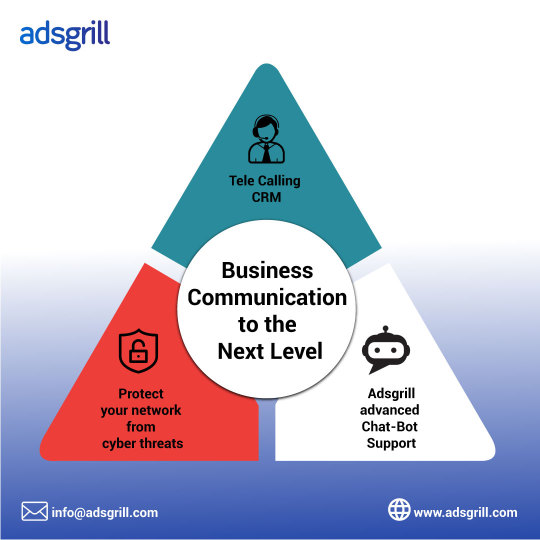
Elevate your interactions with cutting-edge strategies and technology, fostering seamless collaboration, global connectivity, and impactful messaging for enhanced productivity and success. More Info:- https://adsgrill.com/communication/
0 notes
Text
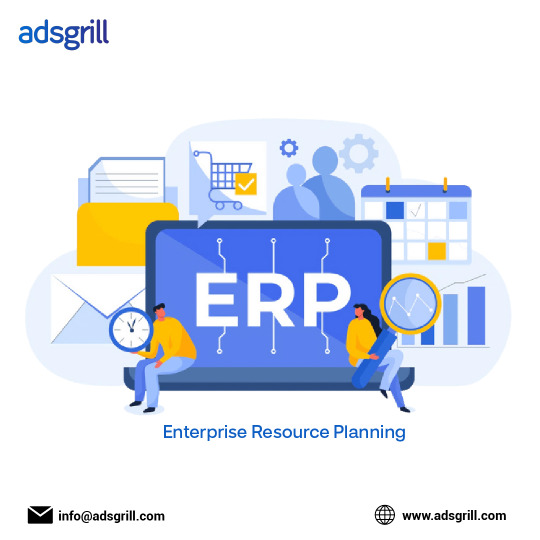
Enterprise Resource Planning (ERP) software is a suite of integrated applications that help businesses to manage their core processes, such as inventory and order management, accounting, human resources, customer relationship management, and more. By automating and integrating these processes, ERP software solutions can help businesses to streamline their operations, reduce costs, improve productivity and overall efficiency.
More Info:- https://adsgrill.com/
.
.
.
.
.
#erp#software#business#erpsoftware#adsgrill#technology#crm#sap#o#erpsystem#erpsolutions#ecommerce#odoo#erpsolution#accounting#ocd#cloud#clouderp#saphana#sapbusinessone#dynamics#pos#m#finance#tecnologia#hana#education#management#ocdawareness
0 notes
Text
Benefits of ERP Systems in the Healthcare Industry
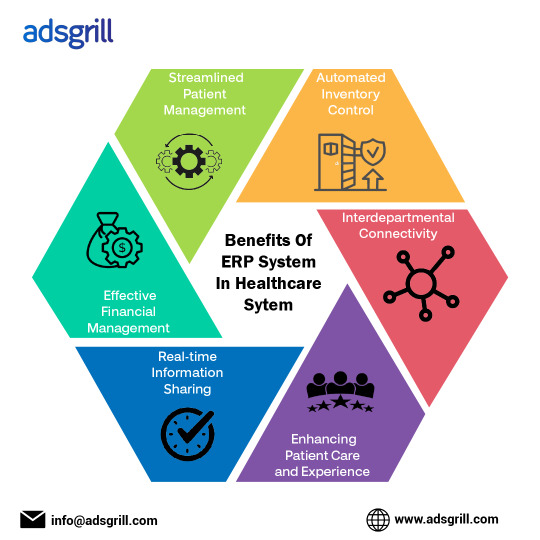
The system selected by a hospital or physician network will be determined by a variety of variables, including integration with existing systems, hospital or network size, and whether mobile access is relevant.
0 notes
Text
ERP for the Healthcare Industry
Enterprise resource planning (ERP) systems are used by businesses of all sizes to manage their core operations. In the healthcare industry, ERP systems can be used to improve efficiency, reduce costs, and improve patient care. Here are some of the benefits of using ERP for the healthcare industry:
Improved efficiency: ERP systems can help to improve efficiency by automating many of the manual tasks that are currently performed in healthcare organizations. This can free up staff time to focus on more important tasks, such as providing patient care.
Reduced costs: ERP systems can help to reduce costs by streamlining processes and eliminating waste. For example, an ERP system can help to track inventory levels so that healthcare organizations don't overstock or understock supplies.
Improved patient care: ERP systems can help to improve patient care by providing healthcare providers with access to real-time patient data. This can help providers to make better decisions about patient care and to provide more timely and accurate care.
Here are some of the features that are typically included in ERP systems for the healthcare industry:
Financial management: ERP systems can help to track financial data, such as patient billing, accounts payable, and accounts receivable.
Human resources: ERP systems can help to manage human resources data, such as employee records, payroll, and benefits.
Supply chain management: ERP systems can help to manage the supply chain, including tracking inventory levels, ordering supplies, and managing transportation.
Clinical data management: ERP systems can help to manage clinical data, such as patient records, lab results, and prescription information.
ERP systems for the healthcare industry can be a valuable tool for improving efficiency, reducing costs, and improving patient care. However, it is important to choose an ERP system that is specifically designed for the healthcare industry. This will ensure that the system meets the specific needs of healthcare organizations.Here are some of the factors to consider when choosing an ERP system for the healthcare industry:
The size and complexity of the organization: The size and complexity of the organization will determine the size and complexity of the ERP system that is needed.
The specific needs of the organization: The organization's specific needs, such as the type of healthcare services that are provided, will also need to be considered when choosing an ERP system.
The budget: The budget for the ERP system will also need to be considered.
ERP systems for the healthcare industry can be a valuable tool for improving efficiency, reducing costs, and improving patient care. However, it is important to choose an ERP system that is specifically designed for the healthcare industry and that meets the specific needs of the organization.
0 notes
Text
Challenges Faced by the Healthcare Industry without ERP
The healthcare industry plays an important role in society by offering people access to crucial medical services. These industries face several challenges that affect the healthcare industry’s capability to deliver cost-effective and efficient care. These problems, which range from regulatory difficulties to technological improvements, can have a significant impact on how healthcare is delivered and patient outcomes.
More Info:-https://adsgrill.com/erp-for-the-healthcare-industry/
.
.
.
These challenges are given below.
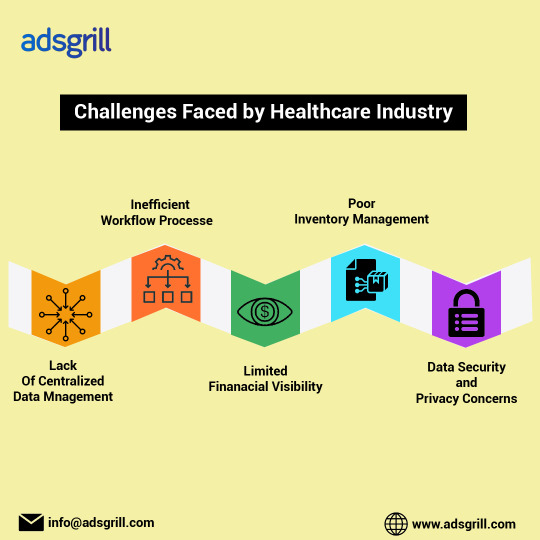
0 notes
Text
Now a days, businesses of all sizes and industries are relying on Enterprise Resource Planning Systems to streamline their operations, enhance productivity, and drive growth. This article will explore different types of ERP software solutions, their functionalities, and their benefits for businesses.
ERP types can be classified according to various characteristics: On-Premises ERP Systems Cloud-Based ERP Systems Custom-built, ready-made, or hybrid solutions Generic or industry-specific Designed for small, midsize, or large companies Mobile ERP Systems
More info:-https://adsgrill.com/types-of-erp-system/
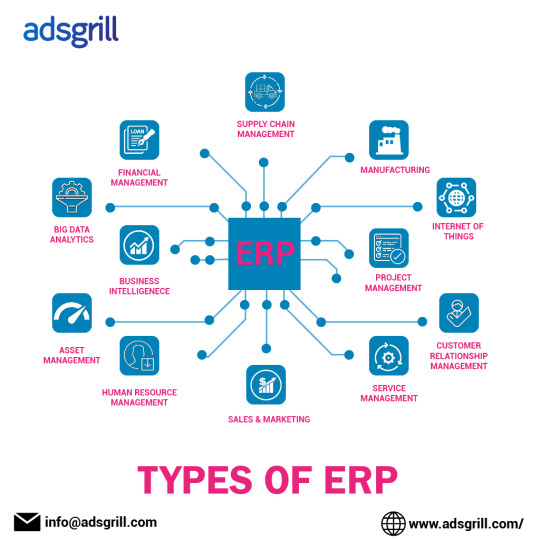
0 notes
Text
CRM Application
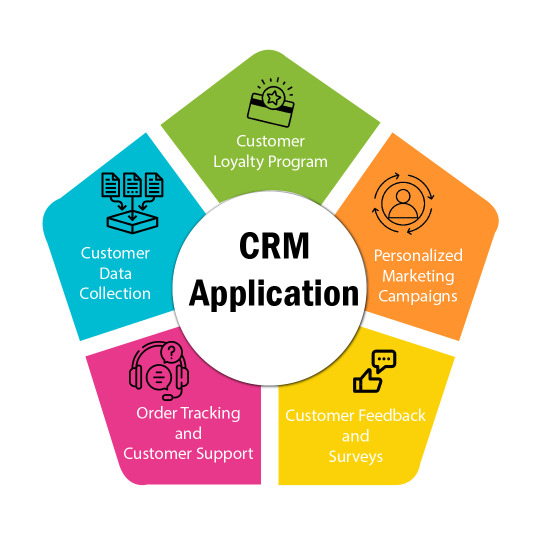
CRM (Customer Relationship Management), is a powerful tool that helps businesses to manage and analyze their interactions with current and potential customers. By utilizing CRM software, companies can streamline their sales, marketing, and customer service processes, ultimately improving their overall customer satisfaction and loyalty. The idea is straightforward: Improve business ties in order to build your company.
0 notes
Text
Features of ERP Industry
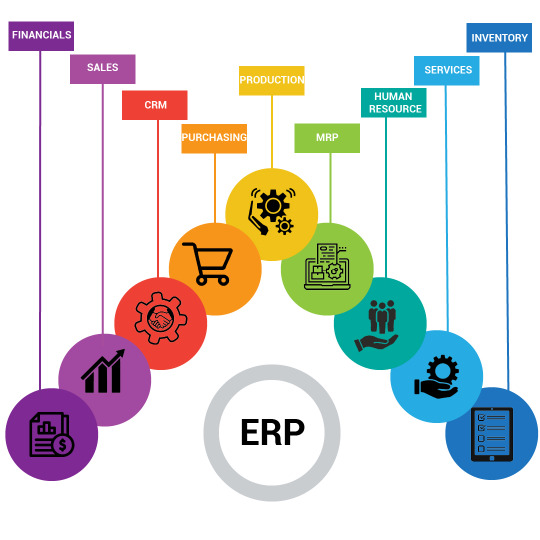
Are you prepared to accelerate your business operations and elevate your efficiency to unparalleled heights? In today's fast-paced and fiercely competitive market, organizations are constantly in search of innovative solutions to stay ahead of the curve. Say hello to ERP (Enterprise Resource Planning), a transformative tool that empowers businesses to streamline their processes, foster enhanced collaboration, and achieve remarkable outcomes. Through this captivating blog article, we will dive deep into the realm of ERP System, unraveling its meaning, types, and real-world applications. Whether you are a small startup or a large-scale enterprise, understanding ERP can be the key to unlocking your full potential. So, let's embark on this.
More Info:- https://adsgrill.com/
0 notes
Text
ERP
We provide comprehensive ERP software development process solutions to optimize business processes for our clients, with a team of experienced professionals who specialize in implementation, customization, training, and support.

1 note
·
View note